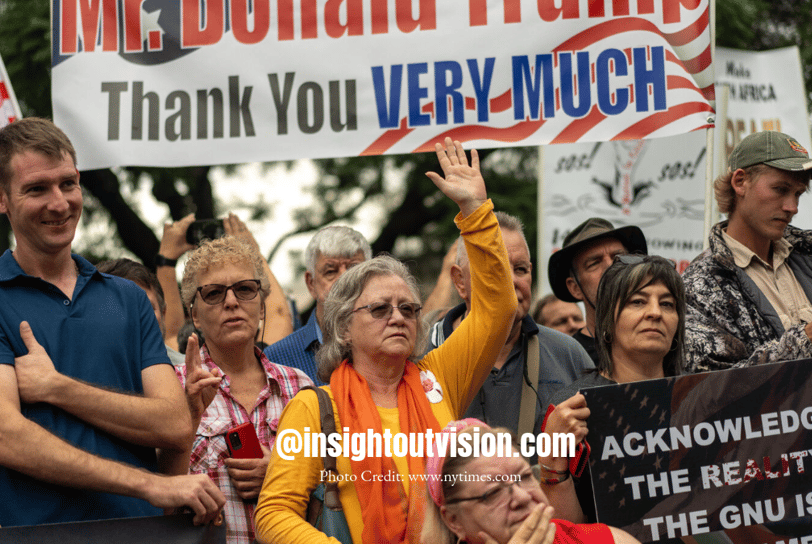Trump’s Refugee Policies: Afrikaners vs. Deportations to El Salvador – A Tale of Two Extremes
5/13/20253 min read


Trump’s Refugee Policies: Afrikaners vs. Deportations to El Salvador – A Tale of Two Extremes
Introduction: Contrasting Agendas
In 2025, the Trump administration’s immigration policies have once again thrust the U.S. into the global spotlight, but for starkly different reasons. On one hand, 59 white South Africans, primarily Afrikaners, were fast-tracked as refugees, welcomed with open arms under claims of racial persecution. On the other, hundreds of immigrants, many with U.S. citizen family members, were deported to El Salvador’s notorious prisons, often without due process. These two policies, seemingly at odds, reveal a deeper narrative about privilege, persecution, and the selective application of humanitarian principles. Let’s dive into the details and unravel the implications.
Afrikaners as Refugees: A Controversial Welcome
On May 12, 2025, 59 Afrikaners landed at Washington Dulles International Airport, part of a program prioritizing their resettlement due to alleged “racial discrimination” and “genocide” in South Africa. President Trump’s executive order, signed in February 2025, targeted Afrikaners and other racial minorities, requiring evidence of past or feared future persecution. The State Department justified this by citing land expropriation and violence against white farmers, despite South Africa’s government denying these claims as baseless. Critics, including Human Rights Watch and Democratic lawmakers, labeled the move as racially motivated, especially given the simultaneous halt on nearly all other refugee admissions from war-torn regions.
Deportations to El Salvador: A Harsh Reality
Contrastingly, Trump’s administration has deported hundreds of immigrants to El Salvador, often to its infamous Terrorism Confinement Center, under contested legal authorities. Many of these individuals are accused of gang affiliations, but a significant number have not committed crimes or undergone proper legal processes. Families are torn apart, with U.S. citizen spouses and children left behind, questioning the fairness and legality of these actions. Trump’s enthusiasm for this policy, expressed during Salvadoran President Nayib Bukele’s visit, ignores the human rights abuses documented in El Salvador’s prisons and the lack of due process for those deported.
The Double Standard
The juxtaposition of these policies is jarring. Afrikaners, a group with historical economic privilege in South Africa, are granted refugee status based on disputed claims, while immigrants with deep ties to the U.S. are expelled to a country with severe human rights issues. This double standard raises questions about the criteria for refugee status and deportation. The Afrikaner program aligns with a narrative of white victimization, supported by figures like Elon Musk and Secretary of State Marco Rubio, yet lacks empirical evidence of systemic persecution. Meanwhile, deportations to El Salvador seem driven by a narrative of criminality, often without substantiation, perpetuating a cycle of fear and misinformation.
International and Domestic Backlash
South Africa’s government, led by President Cyril Ramaphosa, has rejected the persecution narrative, accusing the U.S. of meddling and undermining sovereignty. Globally, the Afrikaner refugee program has been criticized for racial bias, while deportations to El Salvador have drawn condemnation for human rights violations. Domestically, these policies deepen divides, with supporters viewing them as bold stands against perceived injustices, and opponents seeing them as emblematic of a flawed, racially charged agenda.
Analysis: Privilege, Persecution, and Policy
The Afrikaner refugee program and deportations to El Salvador are not isolated incidents but part of a broader pattern under Trump’s immigration strategy. Both policies prioritize narrative over evidence, appealing to specific political bases rather than adhering to legal or humanitarian standards. The Afrikaner case exploits a “white genocide” myth, despite data showing no disproportionate targeting of white farmers. Conversely, deportations to El Salvador leverage a “criminal alien” narrative, often without due process, ignoring the familial and community ties of those affected.
This selective application of policy underscores a troubling trend: the use of immigration as a tool for political signaling rather than a mechanism for justice. The backlash from South Africa, human rights organizations, and U.S. allies highlights the diplomatic and moral costs. As more Afrikaners are expected to arrive and deportations continue, the U.S. risks eroding its humanitarian legacy and international standing.
Engaging the Reader: What’s Next?
As these policies unfold, the world watches how the U.S. navigates its commitments to fairness and human rights. Will legal challenges and international pressure alter the course, or will the administration double down? The contrast between welcoming Afrikaners and rejecting others, including those with U.S. citizen families, invites scrutiny of what defines refuge and justice in 2025.
Thought Questions for Readers:
Should refugee status be granted based on historical privilege or verified persecution, regardless of race?
How do these policies reflect broader trends in U.S. immigration enforcement under Trump?
What role should international allies play in challenging or supporting such divisive policies?
Could this dual approach set a precedent for other groups seeking similar treatment, and how might it reshape global migration patterns?
Explore deep insights on current events and growth.
Vision
Truth
hello@insightoutvision.com
+1-2236036419
© 2025. All rights reserved.
